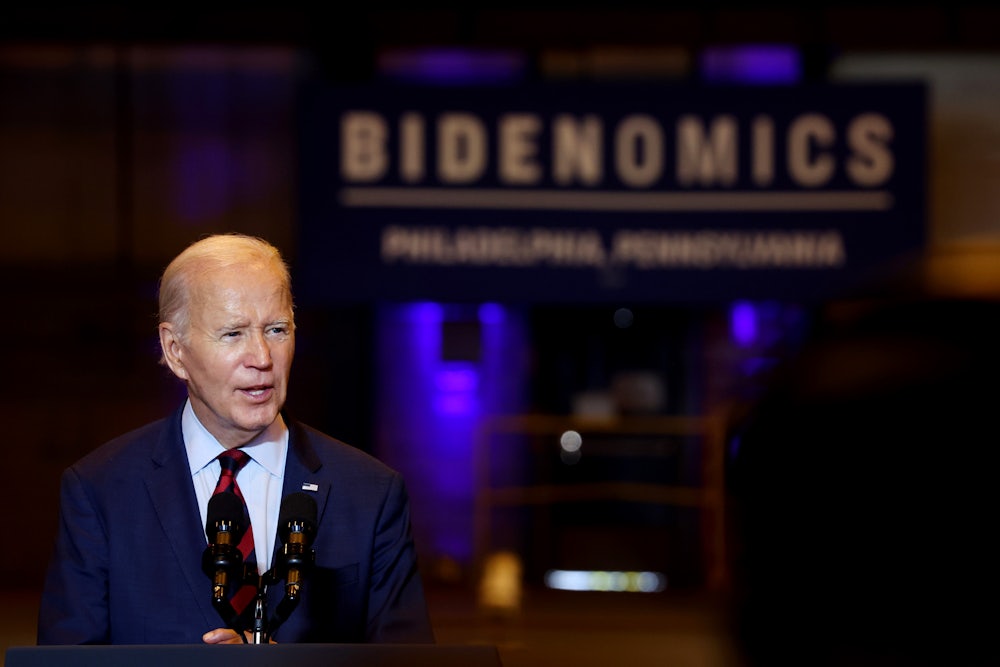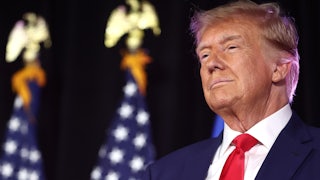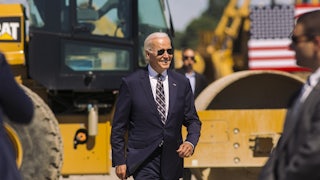My least favorite genre of news story is the folklore beat. You know, stories with headlines that say, “People Believe Stuff That Isn’t True, but They Feel Like It Is True, So Let’s Give Them a Hearing Because We Don’t Want to Seem Elitist.” Covid vaccines are unnecessary. Foreign aid constitutes two-thirds of the federal budget. Donald Trump won the election. Schoolteachers are trying to turn your children gay or trans. Little green men visited Area 51, and the military doesn’t want you to know.
I’ll grant that when misconceptions acquire a large following (though seldom a majority one), that’s news. But is it really necessary to hand a megaphone to every street-corner blowhard in America? News organizations don’t do this because they believe what the blowhards say. They do it because they’re sensitive—too sensitive, if you ask me—to any accusation that they’re out of touch with John Q. Public. And while it’s certainly necessary to document ways in which macroeconomic data fails to capture the complexities of everyday life, particularly with respect to economic inequality, how many times do I have to hear some uninformed fool expound on how President Joe Biden is mishandling the economy? He can’t prove it; he’s not trying to prove it; he just feels that way, and we mustn’t disrespect feelings.
Thus The Wall Street Journal last week: “Biden Goes All In on Bidenomics. Voters Aren’t Buying It.” The voters happen to be wrong, but the Journal—in a news story!—confines that information to a single paragraph that gently points out the existence of a “buoyant labor market,” “robust consumer spending,” “inflation declining,” “a stabilizing housing market,” and other apparent delusions of the economics profession.
Oddly, the Journal’s “voters aren’t buying it” thesis, though in alignment with the polls, does not align with its own (admittedly arbitrary) sampling of voter opinion. Two voters told the Journal the economy hasn’t improved under Biden; one said it’s improved and that Biden should get more credit; and two didn’t talk about the economy at all. What exactly is the point of asking the man on the street what he thinks if you aren’t going to listen to the answer?
That said, yes, the polls do indeed show continuing dissatisfaction with Biden’s handling of the economy. We have now reached the point where the Wall Street titans on whom Biden wishes to raise taxes maintain a higher opinion of Biden’s economic stewardship than the public at large.
Morgan Stanley last week said that because of Bidenomics—specifically “a boom in large-scale infrastructure” created by the 2021 infrastructure bill and strong construction spending in the manufacturing sector—the investment bank is obliged to nearly quadruple its previous estimate of gross domestic product growth for the first six months of 2023, to 1.9 percent. Morgan Stanley also doubled its GDP growth prediction for October–December 2023, to 1.3 percent, and predicts 1.4 percent growth in 2024. Which means, among other things, that Morgan Stanley doesn’t anticipate a recession in 2023 or 2024.
Compare that to poll findings. Only 20 percent of respondents to a CNBC All-America Economic Survey released last week agreed that the economy was excellent or good. That’s up from 15 percent in April, so the trend is moving in the right direction. But it’s moving very slowly.
A separate Monmouth University poll, also released last week, found public opinion split on Biden’s job performance with respect to jobs and unemployment (47 percent approve, 48 percent disapprove), even though unemployment is 3.6 percent, very nearly its lowest point in more than half a century. This too is an improvement on a Monmouth poll from last September, where 43 percent approved of Biden’s handling of jobs and unemployment and 52 percent disapproved. At that time, unemployment was, at 3.5 percent, a whisker lower than it is today.
But inflation! you say. In the Monmouth University poll released last week, only 34 percent approved of how Biden handled it. That’s four percentage points higher than in September—an increase of 13 percent. But give me a break. In September, inflation was 5.4 percent. Today it’s down to 3 percent—a reduction of 44 percent.
Why is the public so reluctant to grasp economic reality? Pull up a chair, and I’ll tell you a story.
In 2016, Gallup polled voters on the economy one week before the election and one week after. During the week preceding the election, with President Obama in the White House and Hillary Clinton widely expected to win, only 16 percent of Republicans thought the economy was improving, compared to 61 percent of Democrats. One week after the election, fully 49 percent of Republicans suddenly thought the economy was improving, compared to only 46 percent of Democrats. Note how much greater this postelection swing was for Republicans: 33 percentage points, compared to 15 for Democrats. It would not, I think, be unscientific to conclude that:
1. In November 2016, whatever you thought about the economy had less to do with the economy than with party affiliation.
2. Republicans were twice as mindlessly partisan as Democrats when they opined about economics. My unscientific guess is that the spread has gotten much wider since then.
Now let’s go to the cross-tabulations on last week’s Monmouth University poll. These tell the real story about how voters feel about Bidenomics.
How does voter opinion differ according to party identification on Biden’s handling of jobs and unemployment? So much so as to render the 47–48 percent figure meaningless. Among Democrats, 84 percent approve, in rough approximation to objective reality. Among Republicans, only 15 percent do.
Inflation? Only 5 percent of Republicans approve of how Biden handled that, as against 71 percent of Democrats. If the judgments of both remain less favorable than on jobs and unemployment, that’s because inflation, though greatly diminished, remains above the Fed’s target level of 2 percent (though if you ask me, 3 percent inflation is pretty low).
The inescapable conclusion is that when you ask somebody whether the economy is doing well, you won’t get an answer about the economy. You may not even get an answer about that individual’s personal experience (which may or may not reflect broader economic trends as compared to one, two, or 10 years ago). Most of the time, you’d be better off just asking, “Are you a Democrat or a Republican?” Because these days, that determines how people—especially Republicans—feel about pretty much everything. If the man on the street sounds like a blowhard, hyperpartisanship explains why. The rest is just noise.






